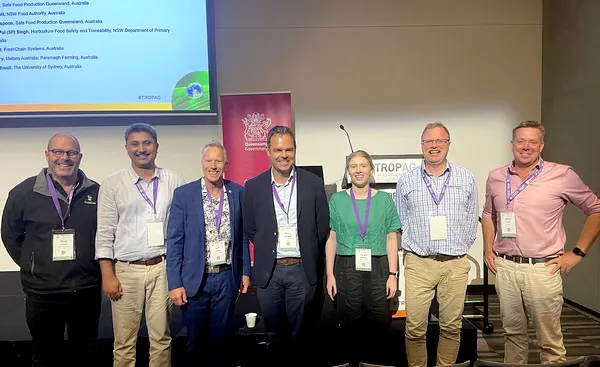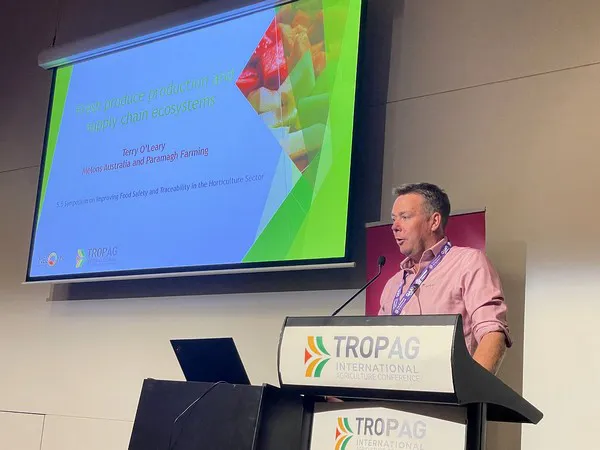Growers, researchers, regulators, and industry members have gathered for the first produce safety and traceability symposium, to draw up plan for supporting growers and supply-chain members deal with upcoming regulatory changes to food safety standards in coming years.
Three new primary production and processing standards have been introduced in the Australian Food Standards Code for berries, leafy vegetables and melons. These standards will be enforced from 12 February 2025, allowing a two-year window of opportunity for preparedness across the industry. One of the ways to raise awareness about regulatory changes, implementing food safety controls, and developing technical resources and support systems for growers and packers, Dr SP Singh from the NSW Department of Primary Industries (NSW DPI) convened a symposium on ‘improving food safety and traceability’ during the recent TropAg International Conference in Brisbane.
“Grower engagement is the key, but it starts with basic questions such as who and where they are, what are they growing and how are they growing it?" Dr Singh said. "Agronomy, pest, and disease management topics are low-hanging fruits on the grower engagement tree, but food safety discussions are highly sensitive and private. Respecting privacy and business confidentiality are essential for a long-term trusted relationship with growers while dealing with food safety."

Photo: Speakers from the symposium at TropAg (source: NSW DPI website)
Dr Singh, an influencer in produce safety and known for implementing science-based solutions in the melon industry, has advocated the need for grassroots-level support during the transition to the regulatory regime with best practice technical resources, training, and education for growers and packers. Knowledge and understanding of the ground reality are critical to applying best practice interventions and targeting resources towards helping the growers in this transition period.
"Some of the key recommendations from the symposium are using a through-chain systems approach for managing food safety risks, with a well-designed and inclusive support system for primary producers and processors," he said. "Also, investing in science- and data-driven approaches to develop and implement best practices to mitigate food safety risks and enable food safety compliance. It is important to have technical expert ‘boots on the ground’ to support growers in improving their food safety systems, with practical considerations in risk assessments and management strategies.
He added that, following the innovative food safety research, development and adoption model adopted in the NSW DPI-led ‘Safe Melons’ program has set an example for other sectors. is This program is nationally recognised by multi-stakeholders for its positive and tangible effects across the supply chain.
"We need to accelerate the adoption of digital traceability to reduce the food safety incident impact and response time," Dr Singh said. "The benefits of digital traceability outweigh the costs of implementing a solution that is based on GS1 global standards and is widely accepted. National funding needs available to support the industry while it is transitioning to a regulatory regime. The success of national traceability grants commissioned by the Australian government is exemplary in laying the foundation for building traceability capacity and capability in the fresh produce industry. Importantly we need to continue collaboration and cooperation through information and data sharing among researchers, regulators, and industry."

Photo: melon grower, Terry O’Leary (source: NSW DPI website)
Terry O’Leary, a fifth-generation grower from Chinchilla, highlighted the rise in consumers’ expectations and regulators’ requirements and their economic and compliance burden on small- to medium-scale growers. He said that ethically and sustainably producing and supplying high-quality produce without an economic incentive at the retail end is a real challenge for primary producers under the current conditions. Mr O'Leary also applauded and attributed the success of the ‘Safe Melons’ program to grower engagement, collaboration and data sharing across the supply chain that allowed targeted interventions and predicted patterns to reduce the risks.
Another speaker was Brian Witherspoon from Safe Food Production Queensland, who talked about the rationale of the new PPP Standards. He emphasised developing and nurturing a food safety culture led by the industry as a suitable approach, rather than purely relying upon regulatory instruments. While Dr Craig Shadbolt, a leading expert from the NSW Food Authority, provided an overview of the recent foodborne illness outbreaks and product recalls linked to fresh produce. He highlighted how critical ‘time’ is during an incident response in accurately identifying the outbreak source and tracing in the increasingly intricate and complex produce supply network.
For more information
Dr SP Singh
NSW Department of Primary Industries
Phone: +61 2 4348 1935
sp.singh@dpi.nsw.gov.au
